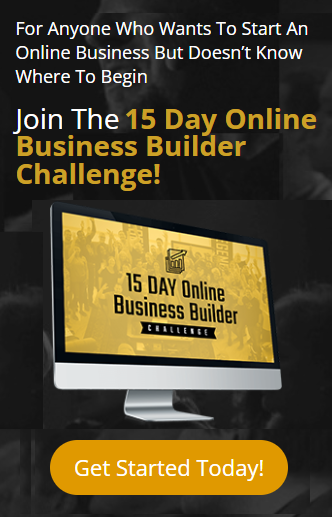Establish A Niche
Before you can start your business, you’ll need to figure out what you’re going to sell and how you’re going to deliver that product or service.
This is called niche identification. It sounds complicated, but it’s not as hard as it seems: Start by asking yourself a few questions—what kind of problem does your product solve?
Who needs that solution? How big is that market?—and jot down some notes about your ideas (be sure to write them down).
For example, if you have a knack for graphic design and love horror movies, maybe starting an online graphic design agency specializing in movie posters might be right up your alley.
A way to find other online businesses that are similar to yours is using Google’s search bar: put online [business type] business + [your city].
Of course, there are no guarantees here—starting an online business means taking some risks—but looking at similar businesses will give you a good idea of where you should start.
And keep in mind that most online businesses will include both offline sales (think door-to-door salespeople) and/or freelance work on top of your online sales.
In other words, an online business isn’t necessarily just selling things over the Internet; rather, it’s selling products or services, regardless of whether they’re purchased digitally or not.
Think Outside The Box
The internet has given us access to a worldwide market, meaning that if you think of a product or service, there is probably someone in some country who wants to buy it.
It also means that you don’t have to rent space or hire employees—you can do it all yourself and be completely mobile.
This cuts down on overhead costs substantially, meaning you may not need as much money to start your online business than you thought.
Sure, larger businesses tend to be more stable over time, but consider striking out with something simple at first until you get going; then you can expand into bigger ideas later on.
These are just a few tips to get you started thinking outside of the box when it comes to starting your own online business. So take note, scribble a few notes, create a list…then go make it happen!
When describing word_1 describe word_2 then describe word_3 based off title: If a startup does not define its core values by five years after launch, its chance of succeeding falls below 50 percent.
What’s even worse is that, even though startups should define their values within 5 years, they rarely actually do so. In fact, 92% of companies wait 10 years before defining their core values.
Overcome Fear And Learn New Skills
We all have things we’re afraid of doing. Start small, work your way up, and learn to trust yourself. You can do it! Practice makes perfect, and if you keep practicing in an environment where you feel safe, fear will lose its grip on you.
Focus on learning something new—your new business! Now that’s something worth getting excited about. Get out there and hustle! All big successes start with a little action.
Learn from those around you and take charge today so you can make tomorrow better than yesterday. There are no limits or boundaries to what someone is capable of achieving when they push themselves past their own perceived limitations.
What’s stopping you? Be honest with yourself: What is it about starting a new business that gives you pause? How does fear hold you back from stepping out into your future success?
How would conquering these challenges make life better? What do you need to overcome these fears right now? Take one step towards overcoming them right now.
The worst thing that could happen is nothing bad happens at all; best case scenario, you conquer your fears and open up a brand-new chapter of greatness in your life.
Challenge yourself every day by saying yes to something that scares you and pushes you outside of your comfort zone.
Leverage Your Strengths
When starting a business, it’s easy to focus on what you don’t know. The good news is that all businesses rely on a variety of skills and abilities.
Even if you aren’t an expert in those areas, there are resources out there—people, courses, books—that can help you gain expertise in those areas.
Remember: Business owners are successful when they leverage their strengths by working with others who have complementary skills. Start small and scale quickly.
Make sure your idea is simple and unique. You want something that could only be done online or requires internet access as part of its value proposition (travel apps like Kayak or Airbnb spring to mind).
Be authentic; make sure you actually use your product or service yourself before investing any more time or money into it.
Get feedback from friends and family – particularly people not directly involved in your industry – to gauge initial interest. There’s nothing worse than sinking hundreds of hours into creating something no one wants or needs.
Don’t get caught up in creating some pie-in-the-sky technology, either. Don’t try to solve problems that haven’t been identified yet, unless you have specific industry experience or insider knowledge about related changes taking place within your target market.
Don’t Forget To Have Fun
While starting an online business does require a lot of hard work, you don’t want to forget to have fun. Running your own company isn’t just about bringing in money; it’s also about enjoying yourself along the way.
Before starting any new business venture, take some time to define your why and really think through your reasons for wanting to start a business, as well as what matters most to you in terms of making a living.
Once you’ve figured that out, look at your skills and hobbies. Can they help you achieve your goals? If so, get started on creating a winning strategy for yourself!
For example, if you enjoy cooking and baking but know people who can’t bake cakes themselves (or don’t have time), consider opening up your own cake-making business!
This is just one example of how taking advantage of your strengths can be used to create a successful business idea.
If you still aren’t sure where to begin, then I recommend trying a search for what type of business you want with how to start a [insert type of business here] appended onto it.
Chances are there will be plenty of blogs discussing ways to set up similar businesses or articles teaching tips and tricks from other entrepreneurs who may have been in your shoes before.
Build on what you already know
If you’re ready to start your own business, chances are there’s a product that exists somewhere out there that you can provide based on your skill set and interests.
If you know how to cook, then open a restaurant; if you’re good with computers, then go into web design; if you have a talent in marketing or sales, create materials or brands—the list goes on.
It doesn’t matter what you do, just that you do something! And don’t forget: It isn’t just about what you do; it is also about who you know and building off of their networks.
You never know when these contacts will come in handy! Remember, knowledge is power so make sure you learn as much as possible by talking to people already running businesses or working within your target area.
Don’t be afraid to ask questions either! Building up your network gives you access to information and new opportunities. So get out there, talk to others and spread some goodwill!
Who knows where it might lead? You could even turn these relationships into lucrative future partnerships if things go well.
Build Relationships Online and Offline
There’s a saying that it takes twenty years to build a reputation and five minutes to ruin it. The same can be said about trust. It takes a long time to gain someone’s trust, but if you breach that trust in any way, your online business may suffer.
Thus, having strong relationships online and offline will help maintain a positive image of your brand or company. After all, who would want to do business with someone they don’t know or feel comfortable dealing with?
Building these bonds also brings people closer together as well. Not only does social media allow us to connect with others across town—and across countries—but real-life interactions are even more meaningful and memorable than those behind computer screens.
Make sure to get involved in communities where your target audience hangs out! You never know what leads you might pick up along the way.
Diversify Your Income Streams
Many entrepreneurs begin with one product or service and gradually expand. If you’re starting a business, you should develop at least two streams of income.
This will ensure that if one stream dries up, you’ll still have another that’s generating cash. And don’t ignore those boring but reliable services; they are actually often more profitable than your core business—like copywriting, web design and marketing consulting.
All these skills could be things you offer to other businesses as well. An extra benefit: These side hustles won’t put much strain on your schedule, allowing you to handle both professional projects with ease.
President Reagan said it best when he told us we need to trust, but verify. When dealing with someone from afar or through email it is very important to protect yourself from harm.
That is why I personally sign my emails using PGP encryption before sending them out into cyberspace. But what does that mean? How do I sign my email using PGP encryption?
Get Comfortable Being Uncomfortable
For anyone starting a business from scratch, it’s a given that you will be spending at least some time in what Seth Godin calls the Dip.The Dip is when you have something to offer, but no one has heard of you yet, so it’s hard to make sales.
Even if your product or service is good and your customers are satisfied, it can still take some time to get people familiar with your brand and start making sales.
It’s incredibly easy to give up during these first few months of business—but know that once you emerge on the other side of being uncomfortable, things will go much more smoothly as word spreads about your new venture.
If you can tough out those early weeks (or months) when sales are slow and cash flow is low, you’ll thank yourself later.
That said, here are ten tips to help you stay motivated while navigating those turbulent initial days:
1. Know Why You’re Doing This
2. Don’t Give Up
3. But Keep Learning
4. Learn From Your Mistakes
5. Find Role Models
6. Outwork Everyone Else
7. Remember: You Can Afford To Wait.
8. Stay Open And Communicative With Customers
9. Save Some Of What You Make
10. Expect Setbacks and Enjoy Yourself!
Never Give Up
If you’re just starting out, don’t let one failure deter you from continuing to build your business.
We all need to start somewhere, and there is no such thing as overnight success—especially in the online world. Your time will come if you never give up on your idea and continue to learn as much as possible about how to make your business succeed.
Even today, I still feel like I have so much to learn! But that doesn’t mean I should stop trying. There are many experts who want to help you along your journey by sharing what they know.
Be open-minded enough to listen—and then do it! Start small and go after it with everything you have.
Remember: Rome wasn’t built in a day…or a year! It took years of dedicated work before anyone took note of Michelangelo or other famous artists of his day.
Don’t be discouraged when people tell you that online businesses can’t be started in 3 months or even 3 years; rather, use their doubts to fuel your fire.
You may even find yourself accomplishing things faster than expected because you didn’t take no way for an answer!
Do you want to learn how to launch a wildy profitable internet business in 15 days that generates consistent income, step-by-step? ➡️15 Day Business Challenge ⬅️







